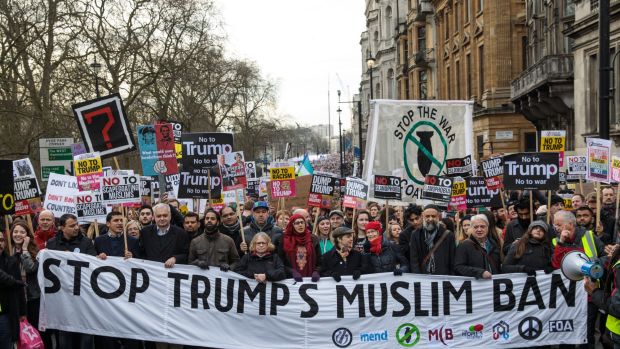President Donald Trump on Saturday attacked a federal judge who temporarily blocked his immigration order, calling him a "so-called judge" whose "ridiculous" ruling would be overturned.
In an early-morning Twitter message from his waterfront Florida resort, where he is spending the weekend, Trump wrote, "The opinion of this so-called judge, which essentially takes law-enforcement away from our country, is ridiculous and will be overturned!"
More World News Videos
Washington state to block Trump immigration order
The state of Washington will challenge U.S. President Donald Trump's executive order banning immigration from some Muslim-majority states in federal court, the state's Attorney General Bob Ferguson said on Monday.
On Friday night, the White House said it would direct the Justice Department to file for an emergency stay of the ruling that would allow continued enforcement of the president's order. In his initial statement, press secretary Sean Spicer described the ruling, issued by Judge James Robart of US District Court in Seattle, as "outrageous."
Minutes later, the White House issued a new statement deleting the word outrageous.

Trump's Twitter post showed no such restraint. It recalled the attacks he made during the presidential campaign on a federal district judge in California who was presiding over a class-action lawsuit involving Trump University.
In the current case, Robart, who was appointed by President George W. Bush, declared that Trump's immigration order, restricting the entry of people from seven predominantly Muslim countries, was invalid because the government was "arguing that we have to protect the US from individuals from these countries, and there's no support for that."
Until now, Trump had been comparatively restrained about the multiple federal judges who have challenged parts of his immigration order, even as he staunchly defended its legality.
Some analysts speculated that he did not want a repeat of the storm during the campaign when he accused Judge Gonzalo P. Curiel of having a conflict of interest in the Trump University case because the judge's family was of Mexican heritage. Trump, who had painted Mexicans as rapists and criminals, settled that case after the election.
Trump defended his policy, declaring in another Twitter post, "When a country is no longer able to say who can, and who cannot, come in & out, especially for reasons of safety & security – Big trouble!"
In a third message, Trump also asserted, without evidence, that some Middle Eastern countries supported the immigration order. "Interesting that certain Middle-Eastern countries agree with the ban," he wrote. "They know that if certain people are allowed in it's death & destruction!"
When a country is no longer able to say who can, and who cannot , come in & out, especially for reasons of safety &.security - big trouble!
— Donald J. Trump (@realDonaldTrump) February 4, 2017
Interesting that certain Middle-Eastern countries agree with the ban. They know if certain people are allowed in it's death & destruction!
— Donald J. Trump (@realDonaldTrump) February 4, 2017
The opinion of this so-called judge, which essentially takes law-enforcement away from our country, is ridiculous and will be overturned!
— Donald J. Trump (@realDonaldTrump) February 4, 2017
Following the Friday night ruling, airlines began to allow travel by those previously barred from doing so, according to a US official.
Trump signed orders on January 27 not only to suspend admission of all refugees into the United States for 120 days but also to implement "new vetting measures" to screen out "radical Islamic terrorists."
Refugee entry from Syria, however, would be suspended indefinitely, and all travel from Syria and six other nations – Iran, Iraq, Libya, Somalia, Sudan and Yemen – is suspended for 90 days. Trump also said he would give priority to Christian refugees over those of other religions, according to the Christian Broadcasting Network.
The New York Times












